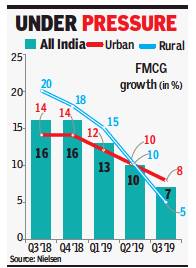Rural economy, markets: India
This is a collection of articles archived for the excellence of their content. |
Rural markets
Growth: 2018> 19
Oct 18, 2019: The Times of India

From: Oct 18, 2019: The Times of India
The decline in rural market growth by a quarter to 5% in Q3 of 2019, as compared to 20% in the corresponding quarter last year, has contributed 60% to the FMCG industry slowdown, according to Nielsen’s report.
In a year’s time, the rural FMCG growth rate has gone down to a quarter of what it was in Q3 of 2018, and for the first time in seven years, rural growth has dipped below that of urban, said Sunil Khiani, head (retail measurement service), Nielsen South Asia. The overall FMCG growth has come down to 7.3% in Q3 of 2019 from 16.2%. “A more worrying sign is that consumption is shrinking. From 13% consumption-led growth, the numbers are down to 3.9%,” Khiani said, adding that the situation had impacted small manufacturers more as they struggle to sustain lower volumes. This affects pricing, and the dynamics of Indian trade does not allow them to expand further.
Nielsen has maintained its annual forecast at 9-10% for calendar year 2019. Nearly half of the FMCG slowdown has come from the north, a region which makes for 30% of the overall FMCG rural volumes. The south on the other hand is plateauing and holding on to the growth rates.
Apart from a flood situation in the north, stress in disposable incomes is said to be taking a toll on consumers and manufacturers. The gap in unemployment rates between the north and south has widened from 3.6% in Q1 of 2018 to over 10% in Q3 of 2019, revealing that more unemployment is setting in the north, Nielsen said, while quoting numbers from the Centre for Monitoring Indian Economy. The auto sector distress is said to have added to the unemployment rates in the north, thus impacting disposable incomes in the region.
Unemployment is more manifested in rural India, with total unemployment rates up from 5.6% to 7.8%. Moreover, rural inflation grew at 28% between Q2 and Q3 of 2019. When impact of lower wages is added to this — 34 out of 35 states in the last 10 years have seen a lower increase in wages — it further reduced incomes, said Khiani.
The impact of rural distress is more pronounced on small players who, Khiani said, are getting wiped out. Growth in rural distribution has remained flat too.
See also
Fast Moving Consumer Goods (FMCG): India
Rural economy, markets: India